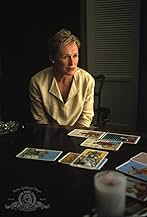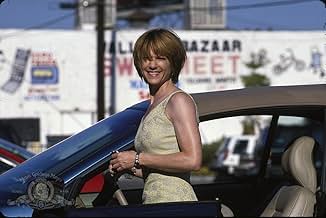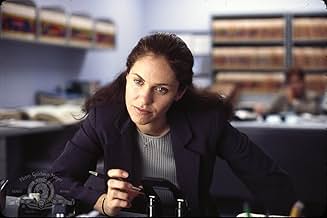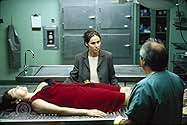Ce que je sais d'elle... d'un simple regard
Titre original : Things You Can Tell Just by Looking at Her
- 2000
- Tous publics
- 1h 49min
NOTE IMDb
6,4/10
7,6 k
MA NOTE
Ajouter une intrigue dans votre langueFive California women struggle with personal problems as their own paths unwind in unexpected ways.Five California women struggle with personal problems as their own paths unwind in unexpected ways.Five California women struggle with personal problems as their own paths unwind in unexpected ways.
- Réalisation
- Scénario
- Casting principal
- Nommé pour 1 Primetime Emmy
- 2 victoires et 1 nomination au total
Penelope Allen
- Nancy (segment "Fantasies About Rebecca")
- (as Penny Allen)
Avis à la une
Things you can tell just by looking at her
In Things you can tell just by looking at her we meet several women who for different reasons seem to be playing bit parts in their own lives. One of them takes care of her mother in a big lonely house, Rebecca stops listening to her own feelings because a baby does not fit into the life of her married lover, Rose discovers that her son is growing up, Calista's girlfriend is dying and ? takes care of her blind sister.
After watching the film I thought: what does this film want to tell us about women? Or perhaps people in general. Some of the lines in the film stuck in my mind: The blind girl says about the woman who committed suicide: `I bet you could tell just by looking at her that there was a man involved.' When giving this line some thought I starting seeing the film as a comment on `loneliness' in general. What do people really want? They want to be involved with people. They want other people to see them.
The film suggests that when people don't depend on anyone anymore when they have no one `to be' for - they chose to actually become nothing to die. The loneliness at the heart of existence is too hard to bear. I think the film is about the nature of making connections and being involved with other people although it is painful and sometimes lead to self-sacrifice. It shows us the horror which is tied with the fear of being left alone, although the connections which are made does little to remove the feeling of loneliness. It is the horror of a stranger walking into your personal sphere and immediately being able to see through you and see what lies beneath the surface. It is the horror of revealing your interest in other people - looking in on other peoples lives, in a desperate attempt to connect and to become involved. It is the horror of becoming involved with someone who cannot stay, the horror of losing those whom you connect with. When you are involved, and when you connect with someone, you face the danger of being hurt, being dumped - of sacrificing your own life in your care for others. It is the horror also that your sacrifice is not appreciated, the horror that when you are no longer a lover or a mother then you will certainly become nothing that your identity is so intricately tied with the dependence of those who need you that you cannot be `you' if they don't need you anymore. It is ultimately the horror of being defined by relations of interdependence where the people you care for in effect give you identity. It is the horror that you really are nothing without other people to mirror yourself in.
Why is this form of `self-sacrifice' then particular to women? We learn from Walter's daughter that when he really gets involved `He dumps them like a hot potato'. Are women victims and easy to exploit? Rose's teenage son confides that people `are always' looking for someone. But is the act of making these connections and becoming involved truly more important to women - truly more essential in their attempt at becoming someone - of gaining an identity. Are women always characterized by either being cared for or being the ones who take care of others? Interestingly, none of these women are wives - they are defined by other types of relationships than those that arise between man and wife.
I do not think I can answer these questions and I don't think the film wants to answer them either. But I think the film is a point of departure for discussing the nature of being - and the way we all perhaps depend upon others in order to become.
7/10
In Things you can tell just by looking at her we meet several women who for different reasons seem to be playing bit parts in their own lives. One of them takes care of her mother in a big lonely house, Rebecca stops listening to her own feelings because a baby does not fit into the life of her married lover, Rose discovers that her son is growing up, Calista's girlfriend is dying and ? takes care of her blind sister.
After watching the film I thought: what does this film want to tell us about women? Or perhaps people in general. Some of the lines in the film stuck in my mind: The blind girl says about the woman who committed suicide: `I bet you could tell just by looking at her that there was a man involved.' When giving this line some thought I starting seeing the film as a comment on `loneliness' in general. What do people really want? They want to be involved with people. They want other people to see them.
The film suggests that when people don't depend on anyone anymore when they have no one `to be' for - they chose to actually become nothing to die. The loneliness at the heart of existence is too hard to bear. I think the film is about the nature of making connections and being involved with other people although it is painful and sometimes lead to self-sacrifice. It shows us the horror which is tied with the fear of being left alone, although the connections which are made does little to remove the feeling of loneliness. It is the horror of a stranger walking into your personal sphere and immediately being able to see through you and see what lies beneath the surface. It is the horror of revealing your interest in other people - looking in on other peoples lives, in a desperate attempt to connect and to become involved. It is the horror of becoming involved with someone who cannot stay, the horror of losing those whom you connect with. When you are involved, and when you connect with someone, you face the danger of being hurt, being dumped - of sacrificing your own life in your care for others. It is the horror also that your sacrifice is not appreciated, the horror that when you are no longer a lover or a mother then you will certainly become nothing that your identity is so intricately tied with the dependence of those who need you that you cannot be `you' if they don't need you anymore. It is ultimately the horror of being defined by relations of interdependence where the people you care for in effect give you identity. It is the horror that you really are nothing without other people to mirror yourself in.
Why is this form of `self-sacrifice' then particular to women? We learn from Walter's daughter that when he really gets involved `He dumps them like a hot potato'. Are women victims and easy to exploit? Rose's teenage son confides that people `are always' looking for someone. But is the act of making these connections and becoming involved truly more important to women - truly more essential in their attempt at becoming someone - of gaining an identity. Are women always characterized by either being cared for or being the ones who take care of others? Interestingly, none of these women are wives - they are defined by other types of relationships than those that arise between man and wife.
I do not think I can answer these questions and I don't think the film wants to answer them either. But I think the film is a point of departure for discussing the nature of being - and the way we all perhaps depend upon others in order to become.
7/10
This film consists of several different stories that are very loosely connected to each other. I was drawn into each individual story but would have liked to have known more about them. What would have made this film really good in my opinion is if there had been a single strong story line woven through all the stories; an interconnection that would have kept the coincidence intact, but would have made it an unseparable whole. That is what I missed. I am very happy though that at the end there was a kind of closing to each of the stories, but that really deserved more time. So a good film, with interesting characters and good portrayals, but it lacked the depth and interconnection that it made me both expect and hope to find.
Some questions remain without a plausible answer: why did THINGS YOU CAN TELL JUST BY LOOKING AT HER go direct to cable TV in the US? I don't know and I'm still angry about that, since it has a great cast and was very well received in Cannes. Fortunately, it was received a limited release here in Brazil, where it was a kind of art-house hit during the time of the year when only blockbusters have their place in the sun. The secret of its success here is not hard to understand: audiences who were tired of Hollywood crap found a small, quiet dramatic comedy with a good story, some heart-breaking moments (and some very funny ones, too) and terrific performances. This is the kind of film that touches everyone, even the coldest and most serious person, making them laugh and feel deep emotions. Despite its division in five stories, all of them excellent (except the part with the lesbian, which was too small), this film is carefully paced, helping us to understand each character's emotions. And each story has an interesting link to the other.
If I had to choose my favorite part, I would have to think. The Dr. Keener story is sad and quiet, the one with Rebecca is the most thought-provoking, while the dwarf story is touching and funny, and the sister-sister story brilliantly closes the film.
If you haven't seen this yet, watch it now. There are not many good films with "women" as the main subject, but this one is one of the best I've seen. It has an eye for detail, it makes us think with its reflection about what women are nowadays (I loved Cameron Diaz guessing about what made her sister's friend committing suicide). And there are great actresses which seem to fit the role perfectly: Glenn Close, Cameron Diaz, Amy Brennemann, Kathy Baker, Holly Hunter, Calista Flockhart and Valeria Golino. I hope Rodrigo Garcia, son of famed writer Gabriel Garcia Marquez, makes other great films like this.
If I had to choose my favorite part, I would have to think. The Dr. Keener story is sad and quiet, the one with Rebecca is the most thought-provoking, while the dwarf story is touching and funny, and the sister-sister story brilliantly closes the film.
If you haven't seen this yet, watch it now. There are not many good films with "women" as the main subject, but this one is one of the best I've seen. It has an eye for detail, it makes us think with its reflection about what women are nowadays (I loved Cameron Diaz guessing about what made her sister's friend committing suicide). And there are great actresses which seem to fit the role perfectly: Glenn Close, Cameron Diaz, Amy Brennemann, Kathy Baker, Holly Hunter, Calista Flockhart and Valeria Golino. I hope Rodrigo Garcia, son of famed writer Gabriel Garcia Marquez, makes other great films like this.
This was okay, I can't fault any of the performances and the 5 (loosely) interconnected stories are well written, imaginative (in a creative writing type way) and interesting however it still failed to grab me on any level or leave a lasting impression.
The vignettes all deal with dramatic developments in the lives of a diverse group of women, most of whom are lonely and or unhappy. All the performances are fantastic and at times raw opening with Glenn Close as a doctor looking after her invalid mother, Holly Hunter as a bank manager dealing with an unplanned pregnancy and an observant street woman, Kathy Baker as a single mother debating a romance with a new neighbour, Calista Flockhart is a tarot reader whose girlfriend is dying of cancer and police detective Amy Brenneman examines her loneliness when her blind sister Cameron Diaz begins dating.
There are some beautifully shot scenes here especially the outdoor ones although I was distracted by the random black cloudiness that appeared at the top of the screen from time to time. Like most people I thought there was something wrong with my copy of the movie. Not sure what that was supposed to signify.
I also think this could have benefited from more of an arc tying all the stories together (like the suicide woman) as it was I failed to see any connection. 5/31/15
The vignettes all deal with dramatic developments in the lives of a diverse group of women, most of whom are lonely and or unhappy. All the performances are fantastic and at times raw opening with Glenn Close as a doctor looking after her invalid mother, Holly Hunter as a bank manager dealing with an unplanned pregnancy and an observant street woman, Kathy Baker as a single mother debating a romance with a new neighbour, Calista Flockhart is a tarot reader whose girlfriend is dying of cancer and police detective Amy Brenneman examines her loneliness when her blind sister Cameron Diaz begins dating.
There are some beautifully shot scenes here especially the outdoor ones although I was distracted by the random black cloudiness that appeared at the top of the screen from time to time. Like most people I thought there was something wrong with my copy of the movie. Not sure what that was supposed to signify.
I also think this could have benefited from more of an arc tying all the stories together (like the suicide woman) as it was I failed to see any connection. 5/31/15
The rest of the movie was a little too self-consciously "arty' for me, but Holly Hunter's performance made it all worthwhile. Her scene on the street was absolutely heart-stopping in its truth. The depth of her emotion is almost an embarrassment to watch. Wonderful stuff, Holly...
Le saviez-vous
- AnecdotesA Braille book that Carol Faber reads is "One Hundred Years of Solitude" by Gabriel García Márquez who happens to be the father of Rodrigo García, this film's director.
- ConnexionsFeatured in The Rosie O'Donnell Show: Épisode #4.170 (2000)
Meilleurs choix
Connectez-vous pour évaluer et suivre la liste de favoris afin de recevoir des recommandations personnalisées
- How long is Things You Can Tell Just by Looking at Her?Alimenté par Alexa
Détails
- Date de sortie
- Pays d’origine
- Site officiel
- Langue
- Aussi connu sous le nom de
- Con tan solo mirarla
- Lieux de tournage
- Sociétés de production
- Voir plus de crédits d'entreprise sur IMDbPro
Box-office
- Montant brut mondial
- 1 433 668 $US
- Durée1 heure 49 minutes
- Couleur
- Mixage
- Rapport de forme
- 1.85 : 1
Contribuer à cette page
Suggérer une modification ou ajouter du contenu manquant

Lacune principale
By what name was Ce que je sais d'elle... d'un simple regard (2000) officially released in India in English?
Répondre





































